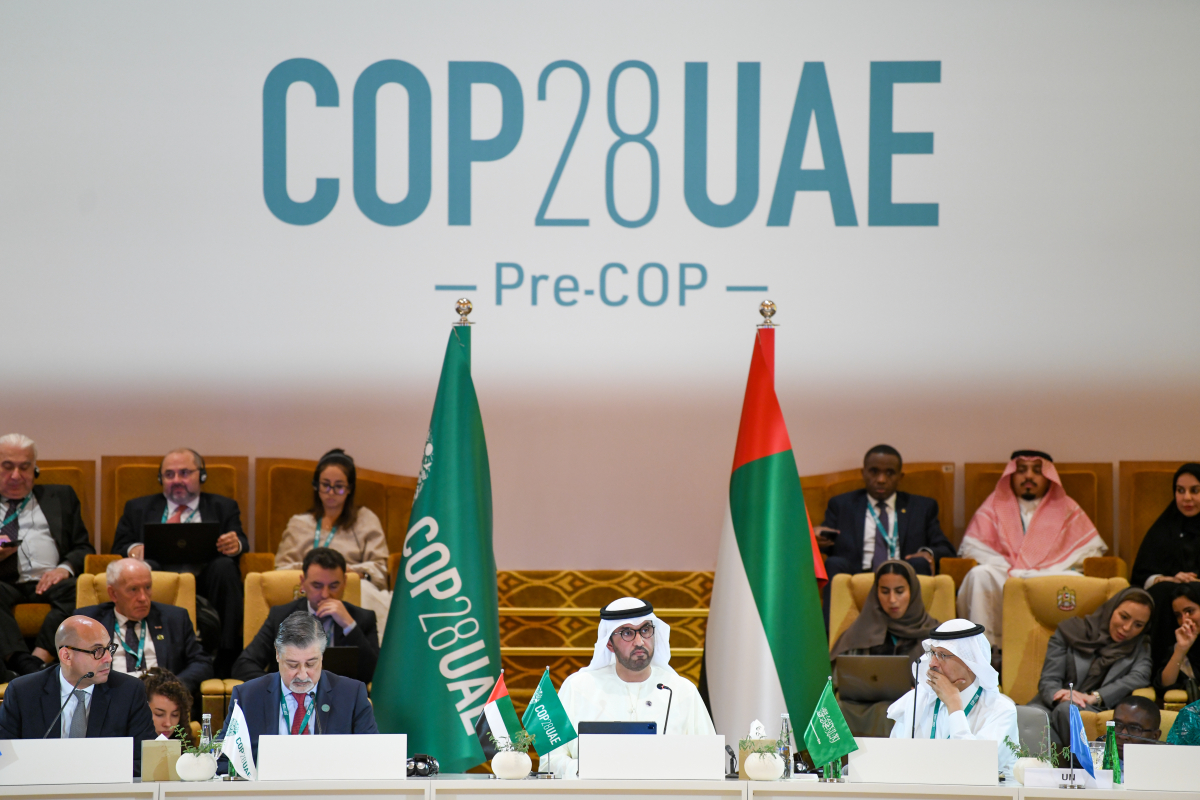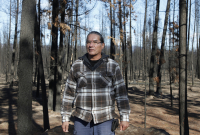With vicious conflicts in Europe, the Middle East, and elsewhere, this year’s climate change negotiations are occurring in a moment of intense international division — and the stakes couldn’t be higher.
Under a blistering sun, more than 70,000 delegates are expected to gather in Dubai for the UN’s annual climate change negotiations, where phasing out fossil fuels, scaling up renewables and finding the cash to pay for the energy transition and compensate countries for climate damage will all be hotly debated. The conference runs from Nov. 30 to Dec. 12.
Since the Paris Agreement was signed in 2015, the annual summit has rocketed into the mainstream as the climate crisis deepens, and world leaders flock to the conference to show off their climate credentials. More than 140 heads of state are expected to attend this year, including U.K. Prime Minister Rishi Sunak, Indian Prime Minister Narendra Modi, and Brazilian President Luiz Inácio Lula da Silva (commonly called Lula).
Barring any last-minute changes, Prime Minister Justin Trudeau is staying on the sidelines, having last attended COP26 in Glasgow in 2021. Canada’s delegation will be led by Environment and Climate Change Minister Steven Guilbeault, a veteran of COP spaces, having attended the very first COP nearly 30 years ago as an environmental advocate.

Because the climate crisis continues to get worse as global greenhouse emissions climb, the stakes of these international negotiations are growing.
This year, the Intergovernmental Panel on Climate Change (IPCC) concluded a six-year evaluation of the latest climate science and found to prevent catastrophic warming, greenhouse gas emissions must be cut approximately in half this decade. If they’re not, the planet will continue to overheat and is more likely to cross dangerous tipping points that when passed, lock in major, irreversible damage.
Since that finding, climate disasters have continued. This year was the hottest on record, scientists predict. Canada saw unprecedented wildfires force thousands from their homes; the United States racked up over $70 billion worth of economic damage from natural disasters like wildfires and extreme storms made worse by climate change; torrential rains in Libya caused dams to collapse, killing more than 10 thousand in severe flooding; a record-breaking heat wave (called Cerberus after the hellhound of Greek myth) baked Europe with temperatures reaching 50 C in Italy — hot enough to melt powerlines.
In the face of this, UN Secretary General António Guterres hasn’t minced words. In July, he declared “the era of global warming has ended; the era of global boiling has arrived.”
Speaking to reporters this week, Guterres said COP28 must be the moment to end the fossil fuel era if the world is going to limit global temperature increases to the Paris Agreement's goal of 1.5 C.
“We need a global commitment to triple renewables, double energy efficiency and bring clean power to all by 2030,” he said. “We need a clear and credible commitment to phase out fossil fuels on a time frame that aligns with the 1.5-degree limit.”
Many climate and nature-related issues will be negotiated, but this year will see a particular focus on commitments to phase out oil and gas, and operationalizing a fund to compensate poorer countries for climate-related loss and damages they experience. Last year, countries could not agree on terms to phase out fossil fuels, but did agree to launch a loss and damage fund that a year later still needs to be empowered to disperse cash to those who need it.
Civil society groups emphasize that for this year’s climate change negotiations to be considered a success, commitments to phase out fossil fuels are necessary. On top of that, a credible finance package that helps pay for the energy transition in developing countries and compensate them for damages is a necessary component, advocates say.
Civil society groups are also expected to push Canada to finally deliver on its promise to cap oil and gas sector emissions. In 2021 at COP26, Trudeau pledged to the world that Canada would limit oil and gas sector emissions and ratchet them down, but that promise has since been mired in political fights with right-wing premiers, chief among them Alberta Premier Danielle Smith. It’s unclear if Canada will announce it during COP28, but federal leaders have said they will publish draft rules to cap oil and gas emissions by the end of this year.
‘Marked by scandal’
While the stakes are high, the lead-up to this year’s summit has been marked by scandals.
The United Arab Emirates is the seventh-largest fossil fuel-producing state in the world (Canada is fourth), and it appointed climate envoy and fossil fuel executive Sultan Ahmed Al Jaber to serve as COP28 president. Al Jaber has faced intense criticism because he serves as the CEO of Abu Dhabi National Oil Company (Adnoc), the world’s 12th-largest oil company, casting doubt on the credibility of the climate talks.
Since his appointment, there have been successive scandals, including Paris Agreement architect Christiana Figueres calling Al Jaber’s focus on finding room for continued fossil fuel development “dangerous”; revelations Adnoc cracked into private emails sent to the UN relating to the conference; and in the immediate lead-up to COP28, the BBC in collaboration with the Centre for Climate Reporting published leaked documents showing the UAE intended to use the climate change summit to ink new fossil fuel deals with more than a dozen countries.
Meetings with Canadian officials are not specifically referenced, but one talking point for a meeting between the UAE and China discusses the possibility of jointly evaluating liquified natural gas (LNG) projects in various countries, including Canada.
A spokesperson for Guilbeault told Canada’s National Observer the minister has met with Al Jaber a handful of times over the past year but has not discussed any commercial interests of either country. Their talks were focused on the climate change negotiations, the spokesperson said. Guilbeault was tapped alongside Egypt’s climate minister to jointly and informally facilitate discussions in the lead-up to COP28 to help land an agreement.
The growing influence of fossil fuel interests on the climate negotiations has been increasingly documented. As previously reported by Canada’s National Observer, at least 636 fossil fuel lobbyists were in Egypt for last year’s conference, representing a 25 per cent increase from the fossil fuel representation in Scotland the year before. Other than the United Arab Emirates, which brought a whopping 1,070 delegates to COP27, the 636 fossil fuel lobbyists, if grouped under a single country, would be the largest delegation, according to the analysis conducted by advocacy groups Corporate Accountability, Corporate Europe Observatory and Global Witness.
Matthew Hoffmann, a University of Toronto professor and co-director of the Environmental Governance Lab at the Munk School of Global Affairs and Public Policy, said he’s observed more fossil fuel participation at COPs, and based on his expertise, he believes the fossil fuel industry has pivoted from simply trying to stop progress to an “insider strategy” to make sure it is shaping the decisions.
“There's chatter about the need for the fossil energy sector to play a role in decarbonization because of the size/expertise of the sector,” he said. “That's not an accident.”
Hoffmann added that he expects phasing out fossil fuels to be a big topic of discussion, but he suspects loopholes will feature heavily.
“I would be surprised if countries agree on consensus language unless the term 'unabated' is put in front of fossil energy,” he said. “They might get language about phasing out unabated fossil energy — fossil energy that's not offset through other means (like carbon capture).”
Alberta’s premier will be attending COP28 to push the province’s fossil fuel agenda, telling reporters she wants to use these international events to secure investment in the province. After unveiling a new carbon capture tax credit that amounts to a new fossil fuel subsidy this week, Smith is on a mission in Dubai to sell the role of carbon capture in the oil industry’s future. Similarly, Saskatchewan, which has consistently opposed federal climate measures, spent $765,000 buying its own pavilion space at COP28 to market itself to potential investors.
The Prairie provinces are in stark contrast to Quebec, which has used the UN space to join the Beyond Oil and Gas Alliance and has pushed Canada to put fossil fuels in the rearview mirror.






Comments
COP conferences are jokes, and no decent news should expend carbon to send any reporter to one. I was pretty furious with the NO for sending a whole delegation to COP26 Glasgow, and their thin reports (including Linda bragging about getting a lecture from Gore, yippee) indicated nothing happened that you couldn't pick up on zoom.
So please tell me nobody from the NO went to COP28.
"So please tell me nobody from the NO went to COP28."
I second that motion, and I do it as a subscriber who helped pay for the short dozen climate fighting flyers who were sent to Scotland not to discuss solutions to fight climate change as much as to schmooze and be a tourist on our dime, all the while claiming it was to hone journalistic skills.
In essence, the NO can afford return plane fare, hotel accommodation and expenses for nearly a dozen staff for more than a week, but can't afford to even have an edit function in its comments section because it's "too expensive." As I said repeatedly then, and as Roy Brander said above, there are wonderful and very affordable digital methods to communicate and report on distant climate conferences and to hone journalism skills remotely.
The original purpose of these events has now been subsumed by the number of carbon pedlars lobbying in the back rooms and hallways to delay climate action, and by celebrity ego. People who think jawing in a big far away crowd where being seen and rubbing shoulders with the famous is more important than working toward genuine climate solutions with honesty and integrity, need to sit down and have a serious think about principles.
COP is now one giant cop out for mankind. It's better to put your eggs in the economic accomplishment basket. The IEA has documented much of that, and it doesn't need a big gabfest to quietly publish its very informative reports, and leave COP to perish in the jaws of the Big Oil sharks who took it over. That is the real story.
Here is what Dave Borlace has to say about COP28:
https://www.youtube.com/watch?v=KN2ETuroink
Memories are flooding back.
What really pushed my buttons back then was that the NO sent all these people overseas and right into a COVID superspreader event. This was two years ago, the height of the pandemic and perfectly timed with a fresh outbreak of a powerful new variant in the UK exacerbated by Boris Johnson's neglect of public health protocols. I was very angry to have been forced to help pay for this bullshit mainly because a close family member is severely immune compromised and not able to travel at all. We still follow all the masking and vaccine efforts to this day.
To top it off, I did not receive any replies to my repeated emails then asking the managing editor to explain herself. The one brief reply from Linda Solomon Wood occurred after some critical comments were published in a subsequent Saxifrage article -- ironically on the emissions of air travel. "Improving journalism skills..." (paraphrasing) was the non answer.
National Observer, I will follow through with cancelling my subscription if this happens again. As it stands, I cringe with every donation solicitation I receive, with the unreasonable expectation that I will pony more money up on top of my subscription fee and possibly pad another needless 'working vacation' for staff.
The only good thing that can be said about it is that at least the NO did not censor critical comments, which places it one notch higher than than the Tyee in my books.
A waste of time and money every year. Lots of hot air, promises and agreements and nothing done by the politicians beyond lip service.
I think more is accomplished outside that circle by the renewable industry than all the hot air by the attendees. But you can rest assured, the politicians will take all the credit for it all.
It appears that COP 28 (and probably future ones) have been co-opted by the fossil fuel industry. Shameful. Do these people really think they and their families will be immune from the terrible impacts of a warming climate?!
I agree that CNO should not be generating CO2 attending COP-out conferences. Instead it should be reporting on how the conference and its attendees should be organized to minimize CO2 production, as well as the normal reporting on the few real advances presented and the major scandals of course.
CNO should not be generating CO2 attending COP-out conferences. Instead it should be reporting on how the conference and its attendees should be organized to minimize CO2 production, as well as the normal reporting on the few real advances presented and the major scandals of course.
CNO should not be generating CO2 attending COP-out conferences. Instead it should be reporting on how the conference and its attendees should be organized to minimize CO2 production, as well as the normal reporting on the few real advances presented and the major scandals of course.
This article was linked again in the newsletter preamble by John Woodsde, who is attending COP28.
A couple of points. First, would the NO publish info on their participation in this event, info relative to the right of subscribers to know where and how much of their money is going to Dubai, and how many NO staff are in attendance?
Second, John mentioned that someone calculated that COP26 generated 72,000 X more value in commitments than the cost of holding the event, with the caveat that commitments can be ignored. If someone else calculated the value of the commitments that were broken since Scotland they'd probably be shocked how far that the number went into the negative.
It took Trudeau all of a few weeks to break his breathless declarations about Paris in 2015 and buy a pipeline and put billions into LNG. These two projects alone topped 60 billion bucks (private + public financing) before they're even completed. Add subsidies and tax credits and what have you either spent, in the works or planned, and we're nearing $100,000,000,000 and who knows how much more lifespan emissions during Trudeau's tenure alone. It's hard to fathom how much larger the numbers would be under Poilievre.
Sending one or two NO staff to COP is more reasonable than sending a short dozen. I'm going to entrust John with my bit of subscription revenue to document the real story: Just how far COP has backslidden and succumbed to the embrace of fossil fuel interests; how enforceable are COP28 commitments, for they are meaningless without teeth; and what exactly would organizations like the NO be better suited to report on regarding giving climate successes first priority over climate failures and repeated disappointments, like COP.
IEA reports and documented progress on renewables are like breaths of fresh, cool air compared to the smoky pall in the poker rooms of COP events.